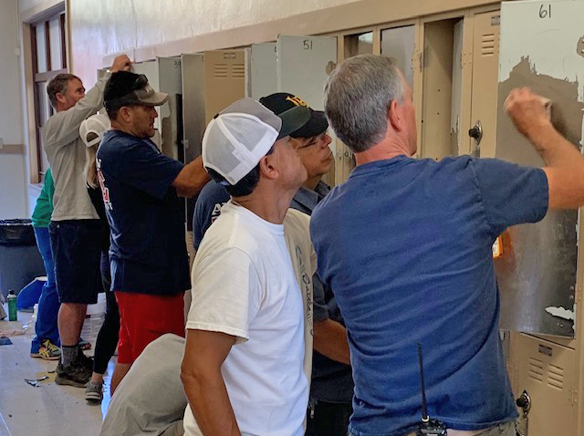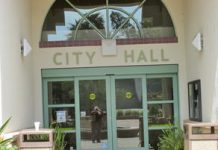
Avalon School seems to have had more than its share of challenges in recent years. Community members grew tired of run-down facilities, instances of bullying and drug and alcohol abuse by students. However, in recent months, community meetings with Long Beach Unified School District and school officials have delivered hope that the school is on the road to a new era.
A task force of community members and parents have been working with school and district officials to formulate a plan for improvement in areas of infrastructure improvements, a Restorative Justice Program, academics and even an Adult English Language program.
“It is encouraging to have the LBUSD work alongside of us in our efforts to foster change for our school,” Cinde MacGugan-Cassidy said.
Monthly meetings between district and school officials and community members have been taking place since September. According to notes from the December and January meetings, which were attended by Chris Brown, Director of High Schools for Long Beach Unified School District, as well as school principal Chris Lounsbery and assistant principal Cheryl Savio, several plans were put into action. More than twenty members of the community attended each meeting, including representatives from the Catalina Island Company, the Conservancy, the Sheriff’s station and the Chamber of Commerce and Visitors Bureau. Representatives, from the Avalon Rotary, Catalina Island Foundation, several of the school’s teachers and parents, as well as Avalon Mayor Pro Tem Cinde MacGugan-Cassidy were also in attendance. MacGugan-Cassidy has been involved in the process, though more as a community member than a city representative, she has said.
Concerns with the school had prompted many community members to opt for home schooling or to move off the island. Jim Luttjohann, President of the Catalina Island Chamber of Commerce & Visitors Bureau, said that those departures have put strain on the community and the businesses on the island. He noted that he was pleased with the progress and was looking forward to more improvements for the school.
“Many of our members have expressed concerns regarding the loss of valued employees who are opting to leave the community in order to place school aged family members in a better learning environment. That is a situation that cannot be allowed to continue,” Luttjohann said.
Brown presented the forum with a list of issues on which the district has been working. He noted a School Priority Project List, recently developed with input from the task force, teachers and students, that is intended to help focus resources and actions on issues of highest priority. Brown said that the lists have been provided to the District Superintendent.
Two issues highlighted in the list included the initiation of a Peer-to-Peer Teacher Coaching Program, to foster improvement of early career teachers and their classroom management capabilities through interaction and mentorship with more experienced teachers. And a new Culture Check Program to promote a positive and safe culture at Avalon School, described in both English and Spanish.
The Culture Check Program included:
• Weekly class competitions for reducing the number of tardies, including incentives
• Policy requiring that all cell phones and electronic devices be placed in teacher assigned racks in the classroom so they will not disturb classes
• Random classroom searches for illegal substances
The school will work on further implementation of the Restorative Justice Program, jointly funded through several local service clubs, foundations, and Avalon School. As well as implementation of a Kids Restorative Justice Club to teach relationship building. By the January meeting supplemental funding for the Restorative Justice Program had been received from the Catalina Island Foundation, Rotary Club and Women’s Forum.
English Classes for Parents have also been initiated, started January and will run through March 2020. The 8-week course offers basic and intermediate classes and had more than 50 people registered as of the January meeting.
Plans have also been made to arrange a visit to mainland schools for Avalon students and teacher chaperones to better understand how other schools address the challenges and opportunities facing Avalon School, create mutual understanding, and build a resource network.
The students are part of an advisory group to Principal Lounsbery and Assistant Principal Savio, which was a recommendation by Chris Brown, and are exploring ways to improve safety, mutual respect, and positive culture at Avalon School. Funding for this project was recently approved by the Catalina Island Foundation (CIF).
“We are committed to supporting efforts to improve Avalon School, and have been very pleased with the recent progress,” said Cliff Hague, one of CIF’s founders.
There is also a School Lunch Pass program in the works that will allow students to leave campus with a picture ID lunch pass during school lunch hours provided they have met certain standards in the prior quarter. This is being adapted from similar programs at mainland schools and is being planned for when the school is fenced with single entry and exit point.
Work continues on getting an approval process to allow for regular community volunteer work and donations in support of Avalon School that has agreement with the school district’s union.
A Behavior intervention Flow Chart was also presented by Lounsbery that lays out how the school will handle behavior incidents at the school. (See Chart Page 11)
Chris Brown presented the Small School Expenses comparison matrix to better understand how resources are allocated to schools. Avalon’s expenses are quite high due to the island location. Key takeaway was that Avalon School has approximately $8.5 million in annual operating costs, with only between $3-4 million provided by ADA (Average Daily Attendance) funds from the State and Feds. Avalon is the only school in the district which costs the district more than the ADA funds provided. The school’s expenses per student, student teacher ratios, and other metrics are compared with other small schools, and show favorable numbers.
However, Avalon School missed out on Title 1 funds for this year, as it only received 73% reporting versus the 75% required, which cost the school in excess of $150,000. Fear of filling out forms by some parents seems to be the issue, and the school is committed to working with the community to improve outreach for next year to qualify for those funds.
“There is still much to be done, but the sense of the attendees at the January task force meeting was that significant progress is being made and committed to by all involved,” Hague said.
The next meeting of the task force, including updates from the district, will be Thursday March 12, at 5:30 p.m. at the Avalon School Library. Interested community members and parents are encouraged to attend.
“It has been encouraging to see so many community members volunteer their time to ensure our children have fair access to a better education in a positive environment. What would really give our efforts a boost, would be to see more parents involved – everyone’s experience and opinion matters, and we need many voices and ideas to push forward. Even a room of parents who choose to listen instead of speak, is a signal to the district and administration that we want the best for our kids,” Julie Perlin Lee, Executive Director of the Catalina Island Museum said.










